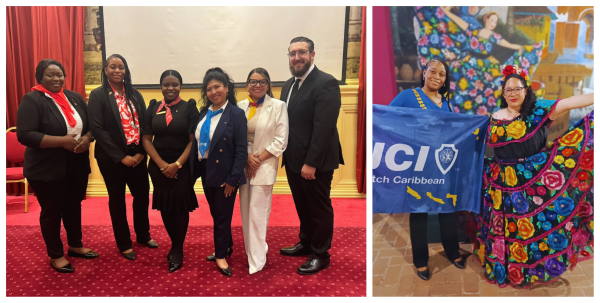Royal couple and Oranje Fonds celebrate 25th anniversary of connected society
On January 30th 2027, the Royal Couple will celebrate the 25th anniversary of the Oranje Fonds at the GelreDome in Arnhem. The event will be broadcast in the Caribbean part of the Kingdom. With this anniversary celebration, the Oranje Fonds wishes to thank all initiators, volunteers and stakeholders who have been working wholeheartedly for 25 years to create a connected society in the Kingdom. The Royal Couple made this announcement on Monday during the 250th Oranje Fonds activity at the Wijkpaleis in Rotterdam, a meeting place for the neighbourhood.
The power of connection
On 1 February 2002, the Netherlands and the Netherlands Antilles presented the Oranje Fonds to the then Prince and Princess as a wedding gift. From day one, the fund's ambition has been to be of real significance to the entire Kingdom. The most important lesson of the past 25 years is that connection makes a difference.
‘Throughout our Kingdom, there are places where people meet, support each other and take action together to tackle problems and strengthen their neighbourhoods and communities. Seeing all these examples of people selflessly helping others gives us enormous hope and energy. As long as we continue to seek each other out, hold each other close and support each other, we will be resilient in a turbulent world. The Oranje Fonds helps with this,' said the King and Queen. With the celebration at GelreDome, the Oranje Fonds wants to put the spotlight on and thank the initiators, volunteers, donors and partners throughout the Kingdom.
The anniversary will be a festive event filled with music and stories. Stories from initiators whose ideas grew into something meaningful. The energy and warmth they bring to society must be visible and tangible both in the stadium and at home. It will be a celebration to inspire and show what happens when people are there for each other and look out for each other. The NOS will broadcast the event live so that people at home can watch and share in the excitement. The celebration will be shown on the Caribbean islands, accompanied by festive moments on all the islands. More information about this will follow later.
Investment in meeting places
The anniversary is more than just a celebration, because we witness that meeting each other is becoming less and less common. More and more people feel alone. That is why we are launching the “Celebrate Connection – Anniversary Fund for Meeting Places” in our anniversary year. With this fund, we are giving a boost to meeting places where people really connect, where a cup of coffee gives way to a conversation. Where people feel like they belong again. In 2027 and 2028, we want to strengthen 1,000 existing meeting places throughout the Kingdom. This will enable these places to bring people together now and in the future. We are doing this with the indispensable start-up funding from the Postcode Lottery, Rabobank and VSBfonds. We invite everyone to contribute to this Anniversary Fund.
The Oranje Fonds has appointed a Recommendation Committee that will contribute its knowledge and expertise to the organisation of the anniversary celebrations. This Committee consists of Kim Putters (chair of the Social and Economic Council), Etienne Ys (former prime minister of the former Netherlands Antilles) and Carola Schouten (mayor of Rotterdam).
Twenty-five years of the Oranje Fonds in figures:
• Oranje Fonds spent more than €600 million on connecting society;
• It facilitated more than 100,000 Neighbours' Day activities;
• And supported more than 125,000 NLdoet activities and 7,000 Cariben Doet activities;
• Over 29.500 projects within the Kingdom received regular support;
• 72 organizations received an Appeltje van Oranje award from the King or Queen, ten of which from the Caribben.
 PHILIPSBURG:--- JCI Dutch Caribbean National President Anjeanee Mathew has successfully concluded her participation in the JCI National Presidents’ Meeting held in Mexico City from January 29–31, joining fellow JCI leaders from across the Americas for strategic dialogue, collaboration, and leadership development.
PHILIPSBURG:--- JCI Dutch Caribbean National President Anjeanee Mathew has successfully concluded her participation in the JCI National Presidents’ Meeting held in Mexico City from January 29–31, joining fellow JCI leaders from across the Americas for strategic dialogue, collaboration, and leadership development.